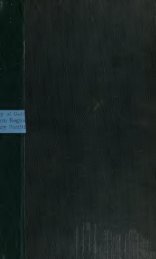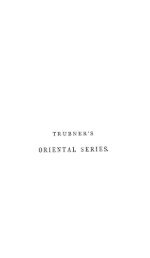Untitled
Untitled
Untitled
You also want an ePaper? Increase the reach of your titles
YUMPU automatically turns print PDFs into web optimized ePapers that Google loves.
120 f NOTES ON THE SECOND DISCOURSE<br />
The 6nly other mention,, of Rafi'i of ftishapur<br />
i<br />
occurs in the<br />
Majmafitl-Fucahd) from which it appears that he vyis a contemporary of<br />
'<br />
,Sultan Mahmu'd of Ghazna (A.H. 388-421 A.D. <<br />
; 998-1030).<br />
i<br />
,<br />
XV. The Vengeance of Sultan 'Ala'u'd-Din Husayn<br />
'<br />
Jahan-suz. t ,<br />
(Text, p. 29*; Persian notes, pp. 1569.)<br />
, By "those two Kings, the Prince-martyr and the Laudable Monarch"<br />
are meant Qutbu'd-Din Muhammad ibn 'Izzu'd-Din Husayn Maliku'l-<br />
Jibdl and his brother Sayfu'd-Din Siiri, the brothers of Sultan 'Ala'u'd-<br />
Din Husyyn. Qutbu'd-Din, whose capital was Fi'riiz-kuh, had quarrelled<br />
with his brothers and gone to Ghazna, where Bahramshah at first<br />
treated him as an honoured guest, but subsequently, his suspicion being<br />
aroused by intriguers, poisoned him. Sayfu'd-Din on hearing this<br />
marched on Ghazna with a large army. Bahramshah fled to India, and<br />
Sayfu'd-Din occupied the 'city, took possession of the throne, and soon<br />
disbanded a great part of his army. On the approach of winter, when the<br />
roads to Ghiir were'blocked with snow and the arrival of reinforcements<br />
was impossible, Bahramshah, at the instigation of his subjects, suddenly<br />
returned to Ghazna, took captive Sayfu'd-Din and his followers, and put<br />
them to death in the year A.H. 544 (A.D 1149-1150).<br />
Sultan 'Ala'u'd-Din Husayn, furious at the loss of a second brother,<br />
sent a threatening quatrain 1 to the Chief Judge of Ghazna, and,<br />
assembling a large army from Ghur and Gharjistan, marched on Ghazna<br />
and proceeded to make good his threats. Having thrice defeated<br />
Bahramshah and compelled him again to retire to India, he occVip^ed<br />
Ghazna, and for seven days and it nights gave up to slaughter, pillage<br />
and destruction. He killed the men, took captive the women and<br />
children, and caused the bodies of all the Kings of Ghazna, except those<br />
of Sultan Mahmud, Mas'ud and Ibrahim, to be exhumed and burned.<br />
During the seven days of massacre and pillage he was drinking anil<br />
making merry in the Royal Palace of Ghazna, and at the end of this<br />
period, when he put a stop to the slaughter, he ordered his minstrels to<br />
sing some rather fine and spirited verses which he had composed for the<br />
occasion 2 . After spending another week in mourning ,for his brothers, he<br />
returned to Ghur with their effects, destroying ott his way all the fine<br />
buildings erected by Sultan Mahmud of Ghazna. Orvreaching Firuz-kiih<br />
he composed another fine but arrogant piece of poetry 3 which he bade<br />
his minstrels sing. These events Ux>k place in A.H. 545 (A.D. i"i5o-i),<br />
the year of his accession to the throne, or in the following yeir. Two or<br />
three years later, in A.H. 547 (A.D. 1152-3), he was fcims&lf defeated and<br />
taken prisoner at Awba near Herat, by Sultan S/anjar the Saljtiq, together<br />
with our author, who refers to this event in Anecdote XXXI.<br />
The chief authority for the history of the Kings of Ghdr is the<br />
Tabaqdt-i-Ndsiri of the Qadi Minhaju'd-Din 'Uthman ibn Siraju'd-Din<br />
Muhammad, who was their contemporary (born 589/1193 a/id su&vived<br />
the* year 658/1260). This valuable history has been published in the<br />
Bibliotheca Indica Series, but the late Major H. G. Raverty's English<br />
1<br />
Persian notes, p. 157, 11. 7-8.<br />
3<br />
Ibid., 1.<br />
p. 158, ii<br />
1.<br />
p. 159, 2.<br />
i<br />
\<br />
2 Ibid., p. 157, 1. 18 p. 158, 1. 5.<br />
'








![La religione di Zarathustra nella storia religiosa dell' Iran [microform]..](https://img.yumpu.com/15970820/1/151x260/la-religione-di-zarathustra-nella-storia-religiosa-dell-iran-microform.jpg?quality=85)


